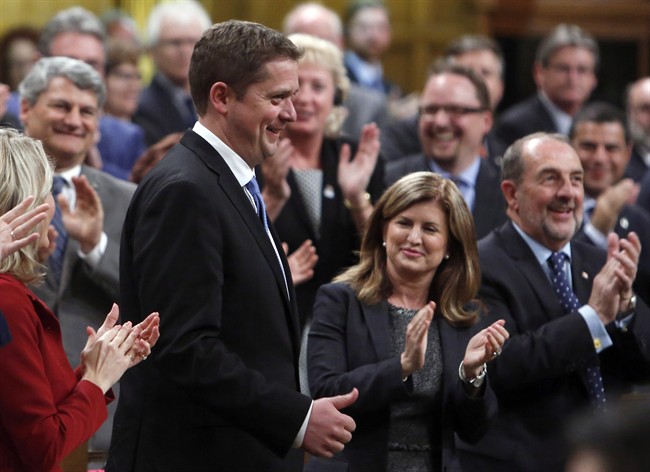For someone who apparently deplores Justin Trudeau’s sunny ways, Andrew Scheer smiles an awful lot. The new Conservative leader radiates positivity, even when he bashes his Liberal foe — a sense of indefatigable optimism that helped push him to victory at the Conservative leadership event Saturday night.

In short, Scheer is hard not to like. His aw-shucks demeanour stood in stark contrast to the overconfidence of his chief rival, Maxime Bernier, who gave what came off as a victory speech the night before the final vote, on the assumption that he was going to take the crown the morning after.
WATCH: Trudeau congratulates Scheer on Conservative leadership win

That faux pas may have been the clincher. In a race where only 1.9 per cent of the points separated Bernier and Scheer, enough undecided voters may have opted for Scheer over Bernier on the last day to help put the Saskatchewan MP over the top. Together with the support of Quebec dairy farmers hell-bent on preserving supply management, and social conservatives seeking a pro-life champion, Scheer triumphed on the 13th ballot, in what was a surprisingly exciting and suspenseful “convention,” despite the fact that most of the ballots had been mailed in weeks before.
But Scheer-fulness will not be enough for the tasks that lie ahead: holding the Conservative party together and carving a path to victory in the 2019 federal election. Already, the new leader is facing a pile of IOUs, most notably from the social conservative wing of the party. Minutes after his victory, pro-life groups began congratulating him on his win — and making their expectations of him clear.
READ MORE: Liberals brand Conservative leadership winner Scheer as social conservative extremist
“Andrew is a leader we are excited to work with because of his voting record, positive pro-life policies and his goal to unite the party and accept that social conservatives need to be part of the conversation,” said the cofounder of RightNow, Scott Hayward, in a news release.
The anti-abortion group We Need a Law sent out an email quoting something Scheer said during the campaign: “I believe 100 per cent that members of Parliament have the right to bring forward and debate legislation of importance to them.”
WATCH: How will Andrew Scheer compare to Stephen Harper?

“We are encouraged,” the email goes on to say, “by this promise of a friendlier and more welcoming environment in Parliament for individual members to introduce legislation protecting pre-born human rights.”
And that’s likely all pro-life groups will get from Scheer, who — despite his own views on the subject — has insisted that the party will not reopen the debate on abortion and the law. His first goal is to unite the party’s disparate factions, including libertarians, fiscal conservatives and social conservatives, without appearing to favour a single element.
READ MORE: COMMENTARY: Scheer wins, now what?
- Man dead after being pushed from downtown Toronto balcony
- AGO workers reach tentative agreement ending month long strike: union
- They stayed at an ‘absolute gem’ of a Dublin hotel. Now these councillors face questions
- On the ‘frontline’: Toronto-area residents hiring security firms to fight auto theft
“Every single kind of Conservative is welcome in this party, and this party belongs to all of you,” he told the crowd after winning the leadership. “We all know what it looks like when Conservatives are divided. We will not let that happen again. We win when we are united.”
Scheer appears set on sticking to the policy path set out by Stephen Harper — allowing individual members to bring forward bills on conscience issues, including the rights of the unborn, while spearheading smaller initiatives that show a commitment to their cause. These could include reversing Trudeau’s reinstatement of abortion funding overseas as part of Canada’s maternal health initiative, or reinstating the Office of Religious Freedoms to defend the interest of persecuted faiths (mostly Christian) abroad.
Another possibility lies on campus: Scheer has said he would de-fund universities that stifle free speech, which could put schools such as the University of Alberta — which effectively shut down an anti-abortion exhibition on campus — in Ottawa’s crosshairs.
READ MORE: New Tory leader Andrew Scheer campaign linked with controversial Rebel Media
But Scheer also must take pains to not be seen as-Harper-with-a-smile. Resentment of Canada’s last PM runs deep in many places and the Liberals will be all too keen to paint Scheer as his doppelganger. Already, they’ve trained their guns on Scheer’s support among social conservatives.
“Make no mistake about it, this is somebody who has voted against every single civil rights advancement in the last 25 years,” said Toronto Liberal MP Adam Vaughan.
Liberal online ads are already rolling clips from the 2015 election, including one featuring Justin Trudeau intoning that “the prime minister’s job is to bring Canadians together, not to tear us apart.”
WATCH: Ambrose looks to Diefenbaker Tories to rejuvenate Conservative party

To counter the Harper 2.0 tag, Scheer could liken himself to another Saskatchewan politician who headed the Progressive Conservative party: John Diefenbaker. Dief may have had his, er, eccentricities, but he gave the Tories a populist patina that helped deliver three government mandates, including a sweeping majority in 1958. His first campaign was run on a platform of lower taxes, expanding trade beyond the United States and offering a stable income for farmers:
“It is a program … for a united Canada, for one Canada, for Canada first, in every aspect of our political and public life, for the welfare of the average man and woman. That is my approach to public affairs and has been throughout my life … A Canada, united from coast to coast, wherein there will be freedom for the individual, freedom of enterprise and where there will be a government which, in all its actions, will remain the servant and not the master of the people.” — From Rogue Tory: The Life and Legend of John Diefenbaker, Smith, Denis (1995)
READ MORE: University of Regina professor weighs in on Andrew Scheer’s federal Conservative Party win
If Scheer could stick to Dief’s highs (enacting the Canadian Bill of Rights) and avoid the lows (alienating Quebec and urban voters), he could make headway against a Liberal government that is failing to keep its promises on a wide range of files, including “modest” deficits, advancement for First Nations and democratic reform. As the storm clouds gather over the Liberals’ sunny ways, a 21st century Scheer-fenbaker could present a potent antidote to Trudeau’s Laurier-lite.
Tasha Kheiriddin can be heard between noon and 2 p.m. ET on Toronto Talk Radio AM640. She’s also a columnist with Global News and iPolitics.ca, where this piece first appeared.








Comments